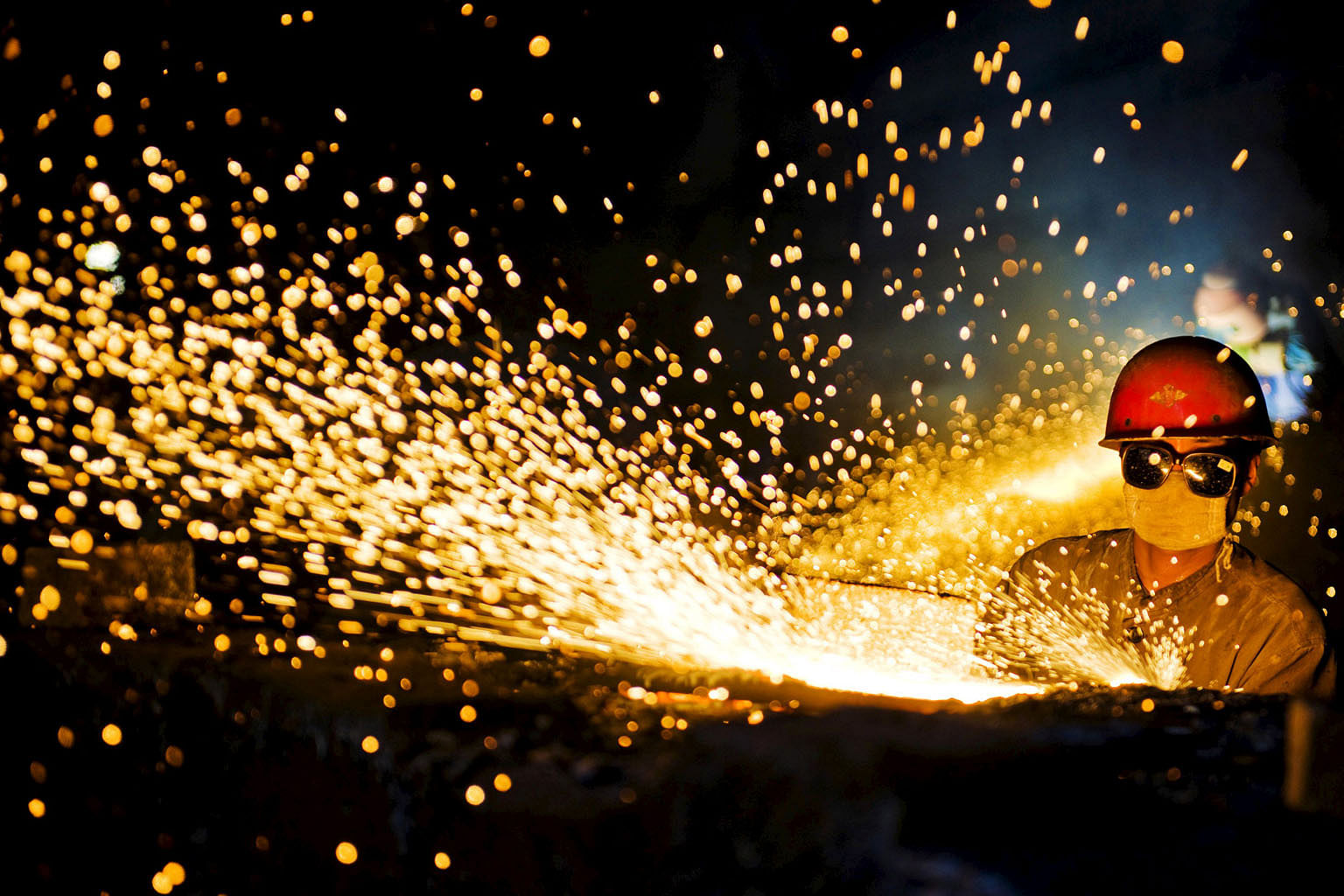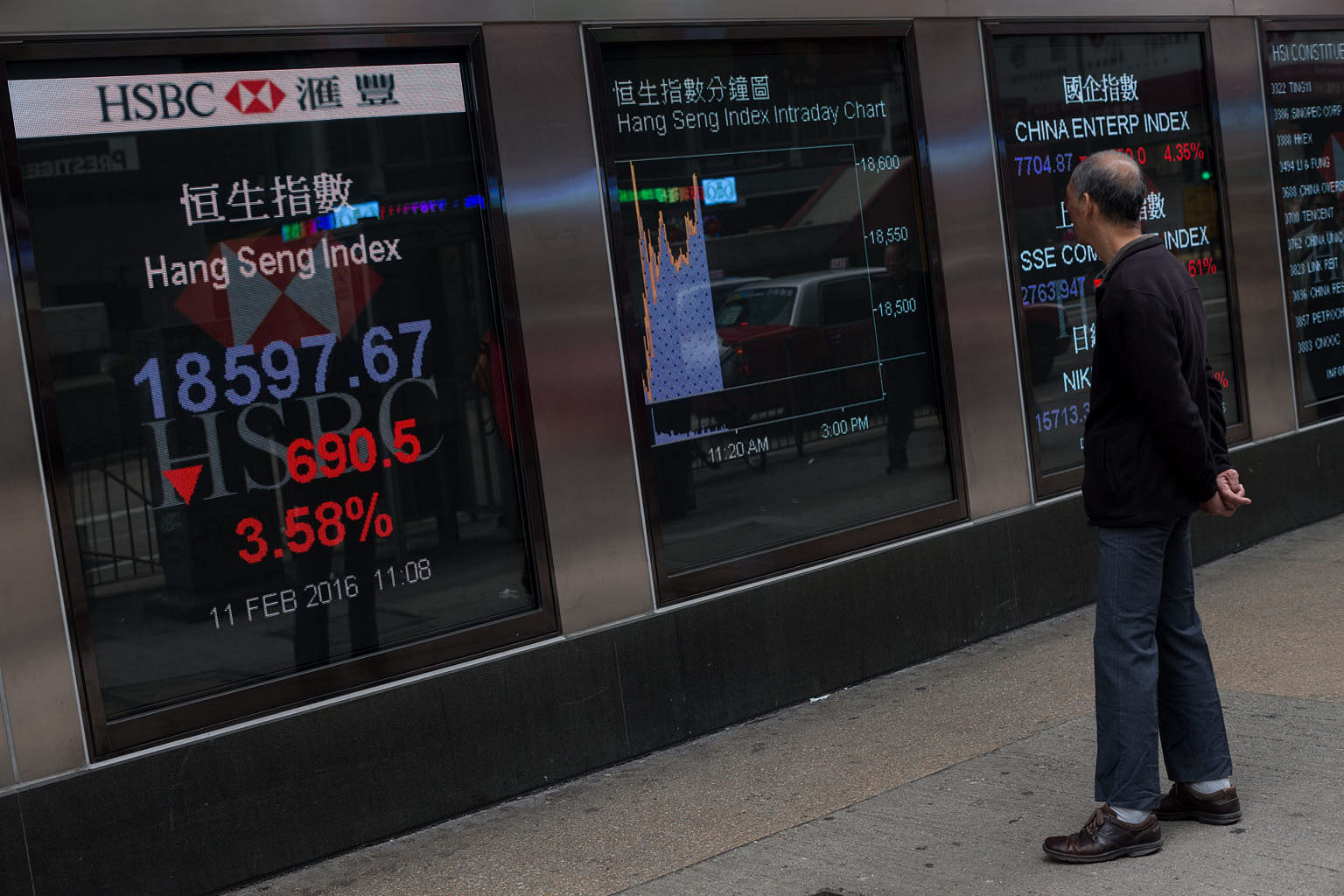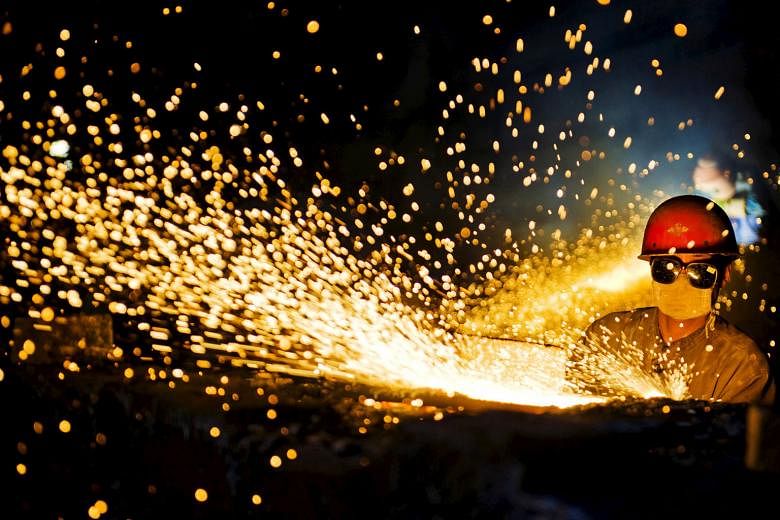Investing in China's assets and related financial products proved highly popular among foreign investors in the past three years, fuelling a steep bull run that lasted till the middle of last year.
Since then, sharp sell-offs on China's bourses, the weakening of the yuan and fears over a sharp slowdown or even recession in the Chinese economy have caused investors to take a cautious attitude towards Chinese assets.
The Sunday Times highlights the performance of various China-related investments in recent years and how one can still invest in the growth, albeit a slowing one, in the world's second-largest economy.
CURRENCY
It was popular to invest in offshore-yuan fixed deposits with banks, said Mr Marc Lansonneur, DBS Bank's head of investment products in Singapore.

From 2013 to last year, the offshore yuan appreciated 12 per cent against the Singdollar, and its deposit rates were higher than here, at 3 to 4 per cent.
However, the offshore yuan has been depreciating rapidly, losing 6 per cent against the Singdollar in the past six months.
The outlook for the offshore yuan is not positive, said Mr Lansonneur.
"Further devaluation may happen in 2016," he added. "Unless investors are comfortable in keeping the yuan as long-term currency placement, given that the deposit rates are above 4 per cent, they should wait until early next year before investing in the yuan."
CHINESE EQUITIES - ETFs AND UNIT TRUSTS
The Chinese equity market's performance has been disappointing so far this year, said iFast assistant director for research and content Ho Song Hui.

The offshore Chinese equity market - also known as H-shares - is measured by the Hang Seng Mainland 100 Index.
It slumped 14.9 per cent in Singdollar terms in the first six weeks of this year.
On the other hand, their onshore counterparts, known as the A-shares and measured by the CSI 300 Index, posted larger losses of 22.2 per cent in the same period.
Taking a look at returns over a longer three-year time frame, A-shares have delivered annualised total returns of 7.2 per cent while H-shares were essentially flat, said Mr Ho.
While it may appear that the H-shares have lagged behind their onshore counterparts over the past three years, H-shares posted a better rate of return until early December 2014.
From then on, the A-share market outperformed on the back of speculation by highly leveraged retail investors, said Mr Ho.
This bull run in Chinese stock markets also attracted the interest of many investors, said Mr Lansonneur. Investors were using exchange-traded funds (ETFs) or unit trusts and sometimes buying A-shares, thanks to the Shanghai-Hong Kong Stock Connect scheme launched in 2014, he said.
Those who invested earlier - at the start of or in the middle of the bull cycle - were able to take profits before the sudden drop last July.
For those who remain invested, it was an unhappy outcome, with a double-digit negative return.
SingCapital chief executive Alfred Chia noted that the China equity ETFs have been on a downtrend for almost a year.
"The performance (of the ETFs) closely mirrors China market benchmarks," said Mr Chia.
Mr Lansonneur observed that unit trusts that are more actively managed delivered better performances than the passive ETFs.
Mr Ho shared the view, pointing out that while the headline indices have not done well, several of the China equity funds have outperformed the H-share market where the majority invest.
"The FSM China Equity index managed to deliver a three-year annualised return of 0.9 per cent, outperforming the offshore market's zero returns," said Mr Ho.
Some actively-managed funds also significantly outperformed the indices. For example, the Neuberger Berman China Equity Fund and the Wells Fargo China Equity Fund have outperformed the H-shares index without suffering the same amount of volatility as the A-shares market, said Mr Ho.
Both funds are predominantly invested in H-shares but with the flexibility to invest in onshore equities as well, he added.
Mr Chia noted that there are many good-quality Chinese companies that are profitable and pay good dividends.
"These are stocks which many Chinese retail investors don't focus on," he said.

So, investing through good fund managers who understand the Chinese markets and have the resources to select such quality companies have become even more important, he added.

While the Chinese stock market presents great potential over the long run, Mr Chia thinks that it is suitable only for investors with appetite for high risk, as it remains a highly volatile market.

Mr Lansonneur said DBS' view on Chinese equity is neutral.
He said: "For investors keen on building a stake, they should do so by investing regularly to mitigate volatility, and through selective unit trusts, which provide necessary market expertise and investment discipline."
CHINESE BONDS AND BOND FUNDS
Weaker fundamentals and market sentiment have also hurt bond prices in general. But it is not all doom and gloom for the Chinese bond market, said Mr Lansonneur.
Some sectors have been holding up rather well in the recent market downturn.
In general, investment-grade bonds have outperformed the high-yield sector, he added.
"Bond issues of corporates like Alibaba, Tencent, state-owned enterprises such as China Unicom, and infrastructure bonds have been relatively resilient amid the recent turmoil."
Chinese property bonds, which were very popular for the past three years, have been affected by both weaker demand and a looming supply of housing projects, especially in the lower-tier regions.
That said, bonds from major companies like Poly Real Estate and Franshion are still performing well.
In general, Chinese bonds denominated in United States dollars have outperformed those denominated in the yuan.
Investing in China proxies on S'pore bourse
Investment-grade bonds denominated in US dollars have delivered a steady 3.5 to 4 per cent annualised return for the past three years. Mr Lansonneur thinks investors can consider Chinese bonds, but they must be very selective and should not chase higher yield by taking higher credit risk.
Investors must be aware that these products are not highly liquid, in particular when markets are volatile. Using unit trusts and the expertise of professional portfolio managers would also be a wise approach for novice investors.
Apart from investing directly in a China-focused bond fund, investors might wish to consider gaining exposure through a more diversified route, said Mr Ho.
Investors could look at Asian bond funds, such as the United Asian Bond Fund and the LionGlobal Asia Bond Fund, where exposure to China is around 35 to 40 per cent of the portfolios, he said.
Both the United Asian Bond Fund and the LionGlobal Asia Bond Fund have held up significantly better than their equity counterparts on a year-to-date basis, with the funds posting declines of 1.7 per cent and 1.5 per cent respectively.
On a three-year annualised return basis, the United Asian Bond Fund has posted gains of 17.6 per cent while the LionGlobal Asia Bond Fund returned 22.2 per cent as of Feb 4, in Singdollar terms.
Mr Ho said: "We continue to like the Asian bond segment, given the relatively attractive yield, as compared with that seen on traditional sovereign bonds, with the segment receiving additional support from the monetary policy easing by the majority of Asian central banks."
SINGAPORE EQUITIES - S-CHIPS AND STOCKS WITH CHINA EXPOSURE
Other than investing in Chinese equities through ETFs and unit trusts, investors can also turn to stocks listed on the Singapore Exchange (SGX).
DBS Bank regional equity strategist Joanne Goh said: "The China proxies listed on the SGX are the remaining S-chips, as well as companies that derive some part of their earnings from China." These would include S-chips such as China Merchants Holdings, which operates toll roads in China, Yangzijiang in shipbuilding, China Everbright in water treatment and Midas Holdings in the railway business.
Apart from these, Singapore property companies such as Yanlord, CapitaLand, Mapletree Greater China Commercial Trust, Frasers Centrepoint and Global Logistic Properties also have earnings exposure in major Chinese cities, said Ms Goh.
The performance of these stocks tends to follow the markets in Hong Kong and China more closely, rising and falling in tandem.
"We have buy calls on CapitaLand and Mapletree Greater China, with a target price of $3.73 and $1.11 respectively," said Ms Goh.
Both companies have about one-quarter of their revenue exposure from China, which can help one diversify from the slow-growth environment in Singapore.
"Properties in major Chinese cities are already seeing price recoveries and should continue to benefit from monetary easing policies in China," she added.
"We also like China Merchants, which has been consistently paying attractive dividends to its shareholders from its steady China toll road business." DBS' target price for China Merchants is $1.45.



